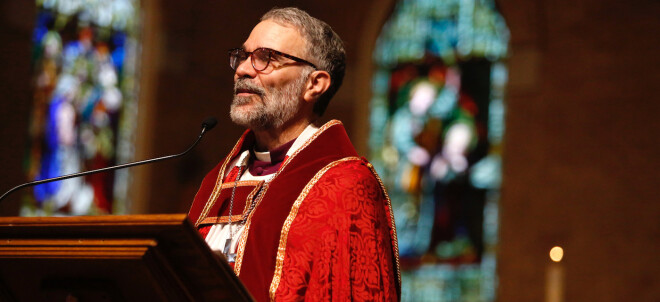Contra Washington: Ten Theses

A recent resolution out of the Diocese of Washington has advocated genderless talk about God. This is not a new thought, though its association with gender neutrality is. In the wake of strong criticism, the bishop has replied that this should be taken not politically but theologically. To honor this distinction, I offer the following theses:
- God is not a creature, and hence is not male or female. God is beyond our knowing, and were we left to our own devices we could only project our own notions upon Him.
- But God has revealed Himself to us in Scripture and pre-eminently in Jesus Christ. In this light, we can rightly understand how creation too reveals His glory.
- Naming is different from describing. Jesus calls God “Abba,” and He is addressed as “my beloved Son.”
- The official liturgies of the Church derive from this revelation and must make sure they address the true God truly.
- As a result we are commanded directly by the risen Jesus to baptize in the name of the “Father and the Son and of the Holy Spirit.”
- In the relation thereby restored, we are given the space to describe God in many ways. Jesus described Himself as a hen gathering her brood. The proper places for such descriptions include private prayers, poems, songs, and even sermons.
- The question of how we address one another is a different one, dependent on custom, language, and usage. It should be debated separately.
- The use of “He” for God is a linguistic accommodation to the Incarnation within the grammatical structures of English. It makes no metaphysical claim.
- Male and female God created us. But their roles had been the subjects of great historical and cultural change, and are an appropriate topic of discussion.
- For the reasons above God should be addressed without exception or change in an orthodox manner in our Church, to His praise and glory.
+GRS




2 Comments
Several points have been instructive to me over the years. One is that pretty much "all" we know that has been recorded about God was penned/dictated/written by males. That provides only one perspective about language, its usage, even its theological impact. Another point is that such publications as these 10 Theses usually overlook how exclusively male imagery of God in the liturgy can be off putting to women who have been abused by men. Similarly the constant reference to God as "father" is equally problematic to women or men who have not had the best relationships with their fathers or the father figures in their lives. Again, there are issues such as abuse and other forms of violence to consider.
It seems disingenuous to say that it is acceptable to refer to God in feminine terms such as a "hen and her brood" in conversation, sermons, songs and private prayers but not in our liturgical forms. Yet the very language about this hen and her brood comes from Scripture. Similarly, God creating male and female in God's image also comes from Scripture. We can read this and we can share it in other ways but we are not to use it in liturgy...liturgy based in great part on Scripture. This is a serious disconnect for me.
We view God as divine. Applying human terms and characteristics is helpful to us in our understanding of God but applying the human to the divine essentially wipes away the divine. God is beyond our description using the languages we have, yet we must somehow give God a descriptive of some kind in order to relate via our limitations as human beings. Since we have been the source of all the descriptives of God, what should make male any different than female? I doubt that this is a concern for God. As I read and study, God's primary interest is being in relationship with us and us being in relationship with each other and both being based on a mutually loving and respectful engagement.
Finally, we are or should be aware that what was written in the ancient and frequently "dead" languages of the past may not have English equivalents that are meaningful today. Scripture was written in languages no longer "in use" so we don't have any "experts" to consult. The languages of Scripture were the subjects of multiple translations into subsequent languages, each with its own set of constructs and limitations as to how concepts were expressed. Some, probably many, just don't translate into our modern languages. And it is instructive to remember that the current canon of Scripture was indeed the result of a vote at a church council. Some books/documents/resources made the cut and others did not. Creating absolutes about this is tenuous at best.
Love God. Love your neighbor. This is Torah. The rest is commentary. (Rabbi Hillel if I remember correctly.)
A response to a response to Ten Theses
Thanks, Bruce, for your response. Because of the importance of the topic, I have decided to make an exception to my usual practice of not answering blog comments. Theological dialogue on matters of common concern is good.
1. Yes, we struggle to apply human words to the divine (see thesis 1). Thank heaven we have revelation to guide us (see thesis 2).
2. The distinction between naming and describing comes from the philosophy of language and does not seem 'disingenuous' to me (see Chris Barrigar's article on this topic).
3. Matters of trauma are important and deserve pastoral attention- nothing in my theses denies this.
4. Here are two things to avoid theologically: a. the deductionism of relegating the canon of Scripture to early Church power politics and b. relegating the Trinity to 'commentary.' Remove these foundations and much else comes down around one's ears.
5. Many people (including me) can read Koine Greek.
+grs